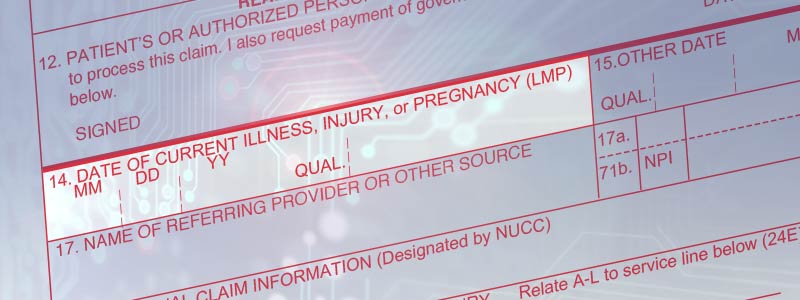by Mario Fucinari •
DC, CPCO, CPPM •
Medicare has announced that audits have resumed as part of the contractor’s responsibilities. While it is true that typically they are just “fishing,” certain information you send in with your claims may trigger an audit. One of these items is the date in Box 14. Even in conventional insurance, box 14 is still a pertinent piece of information to signal the start of a treatment plan, known as the episode of care.
The claim form is used not only to obtain payment, but carriers and other third parties will use the information on the claim form to gain information about the case through data mining. If used properly, Box 14 of the claim form will give information that will answer questions before they arise. If the information is misused, it will probably lead to denial and a possible audit.
Box 14 of the claim form asks for the date of onset, injury, or date of the last menstrual period (LMP). The LMP is used only for obstetrics. The CMS-1500 claim form box 14 also contains a space for a qualifier (Qual). Depending on the carrier, box 14 will usually require the qualifier “431”, which indicates the date of onset or injury. In Medicare, Box 14 indicates the date the patient first began treatment in your office for the most recent diagnosis listed in line A of Box 21. Since in Medicare the date is neither the date of the onset nor the LMP, you do not use a qualifier.
In all Medicare and commercial insurances (Blue Cross, Aetna, UHC, and so forth), the date in Box 14 should be updated if an exacerbation of the condition occurs. According to Medicare, the definition of an exacerbation is, “an acute exacerbation is a temporary but marked deterioration of the patient’s condition that is causing significant interference with activities of daily living due to an acute flare-up of the previously treated condition.”
The Comprehensive Error Rate Testing Program (CERT) consistently ranks maintenance care, a non-covered service, as one of the top three errors in Medicare. Blue Cross is looking for maintenance care as an offender as well. Whether the date is the onset of injury or the date that you first began treating the patient for a certain condition, you can see that if the date has not been updated as indicated, it could trigger an audit. Especially in Medicare, if the date is over 90 days old, it means that you have been treating the patient for over 90 days for the condition. Make sure you do not update Box 14 every 90 days or on re-evaluation to avoid an audit. This may be construed as fraud.
Blue Cross updated its policies to indicate that the “episode of care” should not exceed 90 days unless complicating factors are present to delay the healing process. If complicating factors affect the patient’s care, these diagnosis codes should be listed on the claim form. Complicating factors must always be placed as the last diagnostic code listed on the claim form.
The only case where you never want to update or change the date in Box 14 is in a personal injury or worker’s compensation case. In these types of cases, the date in Box 14 indicates when the accident occurred. Changing the date while the patient progresses would suggest that another injury has occurred. This will usually trigger a questionnaire to see if there is another source of injury.
Your first line of communication to a carrier is the claim form. Clear communication is one step toward unencumbered reimbursement. The doctor and staff must be aware of the information that reviewers are looking for in an audit. Internal monitoring and self-audit of records before they are sent to the carrier will decrease denials, ensure proper reimbursements and decrease recoupment.
Dr. Fucinari is a frequent lecturer for NCMIC, Foot Levelers, and ChiroHealthUSA. Dr. Fucinari is a Medicare and Compliance national speaker. He is a Certified Professional Medical Compliance Specialist and serves on the Carrier Advisory Committee for Medicare. To have Dr. Fucinari speak at your continuing education events, please get in touch with Dr. Fucinari at Doc@Askmario.com.










 ▶︎
▶︎  Why is the Discount Challenge prize amount $15,024? Because that is the average “per-occurrence” fine for Medicare inducements. That’s not $15,024 per patient, that’s not per provider, that’s PER VISIT. Stinks, doesn’t it? To us, the prize amount is worth the investment if we can help our profession better understand proper discounting.
Why is the Discount Challenge prize amount $15,024? Because that is the average “per-occurrence” fine for Medicare inducements. That’s not $15,024 per patient, that’s not per provider, that’s PER VISIT. Stinks, doesn’t it? To us, the prize amount is worth the investment if we can help our profession better understand proper discounting.